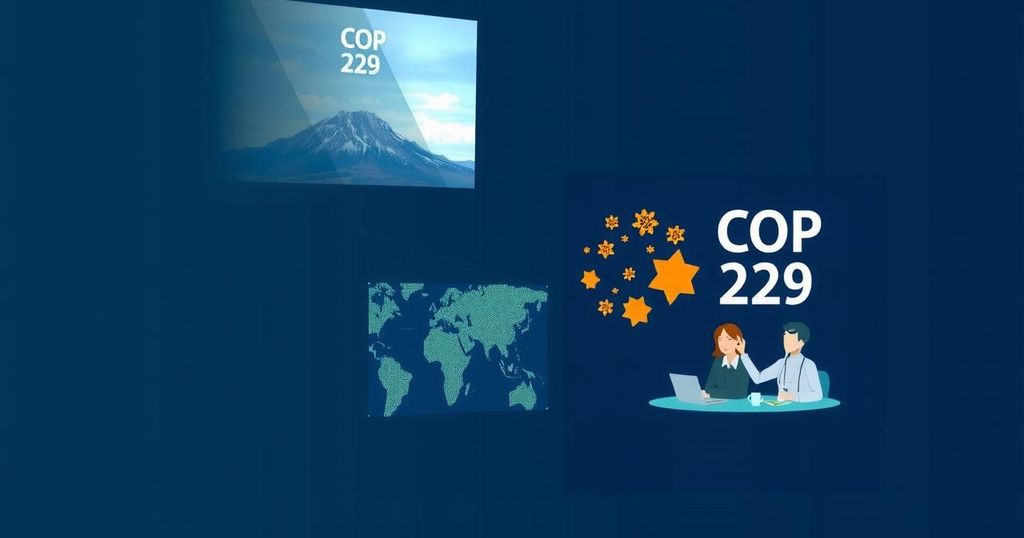Climate change
Technology
AFRICA, AMAZON, ASIA, CLIMATE CHANGE, CLIMATE JUSTICE, ENVIRONMENT, ENVIRONMENTAL POLICY, EUROPE, GREENHOUSE GAS EMISSIONS, INDIA, INTERGOVERNMENTAL PANEL ON CLIMATE CHANGE, IPCC, KENYA, NORTH AMERICA, PARIS AGREEMENT, SPAIN, UNITED STATES, WHO, WORLD HEALTH ORGANIZATION
Fatima Khan
0 Comments
COP29 Special Report: Climate Change and Health as Imperative for Action
The COP29 Special Report emphasizes the critical connection between climate change and health, urging immediate action to mitigate its impacts on well-being. It highlights the necessity to eliminate fossil fuel dependence, create resilient health systems, and ensure equity in climate strategies. The report calls for a cohesive approach that integrates health into climate policymaking, prioritizing human and planetary health to secure a sustainable and just future.
The COP29 Special Report highlights the urgent link between climate change and health, framing health as a vital argument for climate action. It emphasizes that climate change is detrimental to physical and mental well-being, exacerbating conditions due to extreme weather, pollution, and ecosystem disruption. The report calls for immediate action to address fossil fuel dependency, promote health equity, and develop resilient health systems. Furthermore, it asserts that transforming economic systems to prioritize human and planetary health is imperative for achieving sustainable solutions. This approach requires collaboration among various sectors, leveraging urban planning, ensuring equitable access to health resources, and fostering environmental sustainability through restoration and protection of natural systems. The report is underpinned by a comprehensive discussion of how climate change jeopardizes human health globally. It acknowledges the increasing emissions and governmental subsidies favoring fossil fuels while advocating for a realignment of financial systems to prioritize climate and health policy. With cities responsible for a significant share of global emissions, adopting sustainable urban designs and promoting green initiatives are essential in combating health disparities and safeguarding communities. Ultimately, health and climate action must be integrated to create a resilient future that meets the needs of all individuals, emphasizing that health must remain at the forefront of climate negotiations. In summary, the COP29 report serves as a clarion call for health professionals and policymakers alike, advocating for an urgent, health-centered approach to climate action. With compelling evidence illustrating the intersectionality of health and climate, it implores stakeholders to take decisive steps towards safeguarding public health while addressing the climate crisis. The urgency of these actions cannot be overstated, as the well-being of present and future generations hinges on the implementation of equitable and sustainable climate solutions.
The COP29 Special Report stems from the ongoing recognition of the significant impact climate change has on global health. With rising temperatures, increased natural disasters, and worsening air quality, the health consequences are immediate and severe. The report is a response to the Intergovernmental Panel on Climate Change (IPCC) recommendations for immediate transformative actions to mitigate these effects. By emphasizing the need for health to be central to climate strategies, the report identifies an opportunity to not only address health disparities exacerbated by climate change but also to create societal benefits through sustainable practices.
The COP29 Special Report advocates for the integration of health into climate change strategies, emphasizing that the health of populations is directly threatened by climate-related factors. It delineates a pathway towards a more equitable society by urging the cessation of fossil fuel reliance, the establishment of robust health systems, and the realignment of economic structures to reflect health priorities. This comprehensive approach aims to foster environments where health disparities are minimized, and the well-being of ecosystems and communities is secured, underscoring the moral imperative of placing health at the core of climate action.
Original Source: reliefweb.int




Post Comment